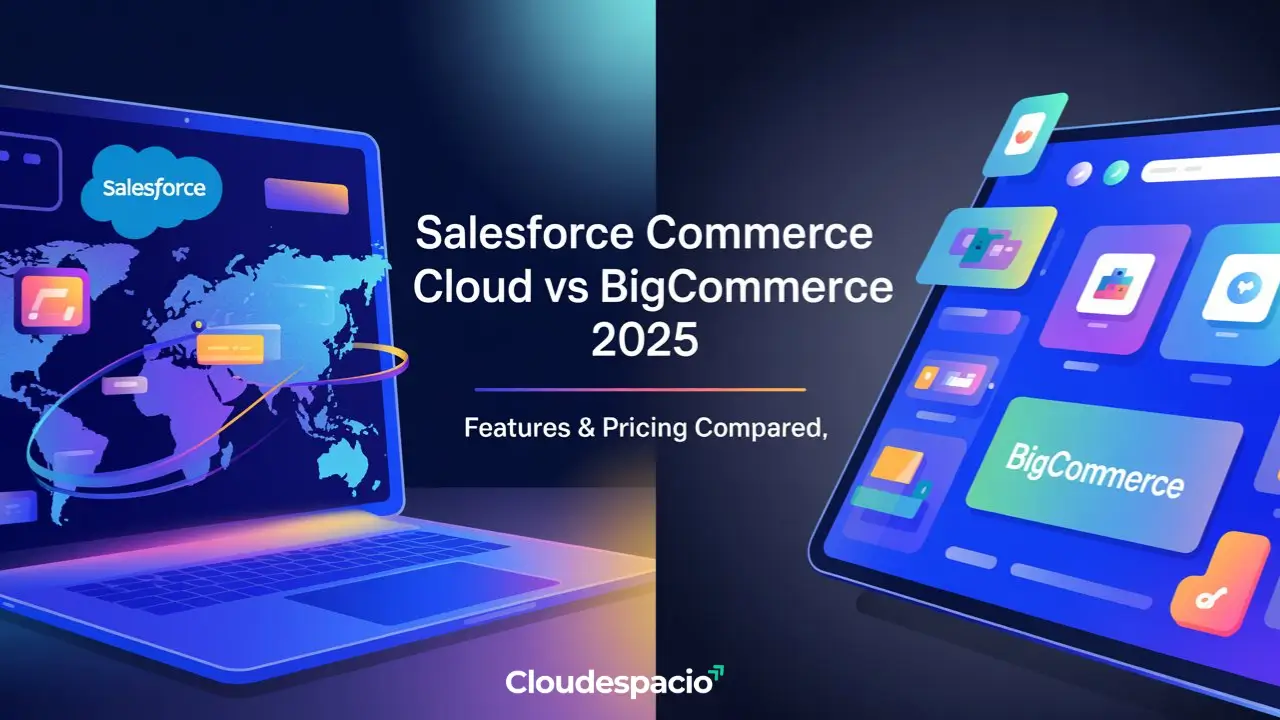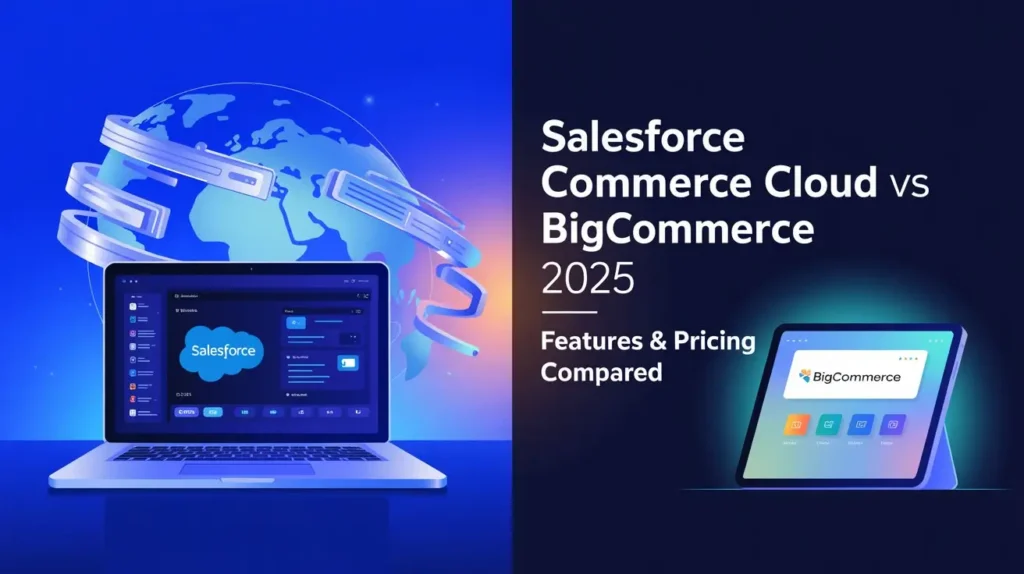


Among the most important decisions for businesses entering enterprise ecommerce is choosing between Salesforce Commerce Cloud VS BigCommerce. While both systems offer particular advantages, they support quite different types of companies. While BigCommerce concentrates on price, usability, and quicker time to market, Salesforce stresses scalability, AI-driven merchandising, and enterprise-grade integrations. This comparison helps decision-makers to choose the platform that best meets their development goals by looking at the most significant aspects: pricing, customization, scalability, artificial intelligence features, ecosystem, and user experiences.
Getting going on BigCommerce is not very difficult. Its dashboard is simple to navigate, and merchants can use themes and extensions free of extensive developer aid. For smaller teams or companies trying to get to market quickly, this fits well. The negative is that more extensive customizations may necessitate third-party programs, therefore raising expenses or fostering dependency on external resources.
Salesforce Commerce Cloud, on the other hand, calls for more technical know-how. Usually implementation calls for certified partners, and the learning curve is great. But that work offers unparalleled flexibility; checkout processes to merchandising logic may all be customized. For companies wanting complete control over every element of customer experience, Salesforce offers significantly more strong customization than BigCommerce.

Pricing for Salesforce Commerce Cloud is determined by a percentage of your revenue—usually 1–3%—plus implementation and continued support charges. Many times, firms view this as an investment that expands with their income, giving access to cutting-edge AI, integrations, and worldwide scalability. Though the first charges are high, Salesforce offers a richer return for companies aiming for long-term growth and innovation.
BigCommerce: By contrast, BigCommerce keeps things simple with transparent subscription plans starting from $39/month up to $399/month. Although obtainable, enterprise pricing is still consistent in contrast to Salesforce. BigCommerce is appealing for companies with limited budgets or those looking for quick deployment because of this clarity. It lets companies spend money on expansion and marketing instead of expensive infrastructure expenditures.
Salesforce has a distinct advantage in terms of scalability in worldwide trade: built-in multi-language support, multi-currency choices, and compliance with global norms.
Salesforce is relied upon by companies running in numerous nations as it manages complexity at size. Its design guarantees uniform performance whether consumers browse in New York, London, or Singapore.
With its multi-storefront function, which lets companies control several storefronts from a single location, BigCommerce has made progress. For regional development especially, this is really helpful. BigCommerce’s scalability usually seems insufficient compared to Salesforce’s enterprise-grade depth, though, when operations grow over dozens of nations with sophisticated product catalogs and rules.
Success in ecommerce now mostly relies on personalization. Einstein artificial intelligence is built into Salesforce Commerce Cloud and drives individualized recommendations, predictive search, and automated product sorting. This produces a very personalized shopping experience that directly raises conversion rates and builds customer loyalty. Large companies with varied clientele absolutely require these artificial intelligence-powered solutions.
BigCommerce does provide customization, albeit primarily via outside sources. Although that maintains the flexibility of the platform, it adds complexity since businesses have to depend on many suppliers. For companies valuing innovation and customer interaction, the absence of local artificial intelligence tools on BigCommerce means that personalization on BigCommerce cannot equal the depth of Salesforce.
Salesforce Commerce Cloud flourishes inside the Salesforce environment. Businesses may link every aspect of the customer journey thanks to integration with Salesforce CRM, Marketing Cloud, and Service Cloud. For decision-makers who already use Salesforce, this synergy provides long-term strategic value by getting rid of data silos and giving them 360-degree customer insights.
BigCommerce emphasizes its composable commerce strategy, which matches the ideas of MACH architecture. It interfaces nicely with many different outside applications, providing flexibility and enabling quicker adoption. Managing several integrations over time, however, can be complicated and demand more attention. For businesses, Salesforce’s ecosystem offers unrivaled long-term stability and value despite being first difficult to configure.
Reviews from outside sources emphasize other virtues. BigCommerce is praised for ease of use, affordability, and built-in search engine optimization capabilities. Mid-market companies searching for a dependable platform free of significant developer expenditure find it especially ideal. BigCommerce also excels in the speed of customer service response.
But companies value Salesforce Commerce Cloud for its international reach, AI-driven merchandising, and scalability. Reviews on websites such Gartner Peer Insights and G2 indicate that Salesforce has a lot of long-term potential, but it also costs more and takes a long time to learn. Many times, Salesforce is the best option for businesses looking for a growth engine instead of only a storefront.
The Salesforce vs BigCommerce discussion is on discovering the correct fit rather than proclaiming a universal winner. For mid-market companies looking for fast deployment, clear pricing, and simplicity of use, BigCommerce is a wise decision. Its affordability and speed make it a sensible choice for smaller businesses.
Conversely, Salesforce Commerce Cloud is designed for major corporations having complicated requirements. The greater initial investment is justified by its worldwide scaling, integrated ecosystem, and artificial intelligence features. Salesforce is the more strategic platform for companies that are interested in long-term digital transformation rather than short-term cost reductions.

Cloudespacio, headquartered in Singapore, is a prominent independent Salesforce and leading consulting firm, dedicated to prioritizing client satisfaction.
Copyright © 2025 All Rights Reserved. Designed by Navpatra.
If you have a project in mind, let’s talk!